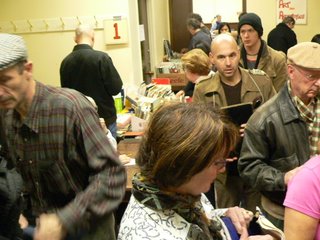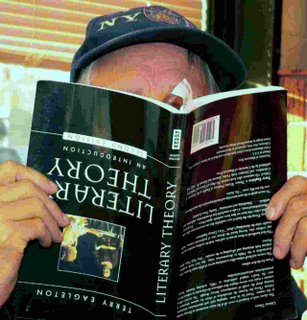LINK:
From the Guardian Unlimited . . .
. . . comes the latest regarding the marketing of books as complementary commodities, ever more cheek-by-jowl to point-of-purchase. If bookstores fail to bring in bigger sales, maybe hardwares stores or even kitchenwares jobbers can.
The one (in the GU's list of examples) that grabbed me was that of TV ads -- selling cookbooks to achieve fast-food taste results. The books sold like the Posture-Pedic(TM) mattresses:
"(with) the example of Penguin's Secret Recipes, by Todd Wilbur, a well-known series of cookbooks that reveal how you can make your own versions of big-name brands popular in the US such as McDonald's burgers or Outback Steakhouse BBQ Sauce. The books were not selling particularly quickly in bookshops so Penguin decided to try something new.
"It published a new collected volume of Wilbur's recipes as a one-off customised venture, and put it on the cable television shopping channel QVC. They billed it as a unique product that could only be bought there and then. In one day, with just five slots of airtime of six minutes each, they sold 100,000 copies of the volume.
'We've moved beyond trying to find new places where we can sell a book,' Ms O'Shea explained. 'We are now spending a lot of time thinking about different ways in which we can produce a book custom-made for the way in which it will be sold and promoted.'"
I'm a blogger on this page who doesn't have the cultural baggage of a Guardian feature writer when it comes to spinning a tale for a readership with inbred cynicism about The American-Way (I grew up in the core of a love-hate bind both in the inner-city and the burbs of North America). I also remember life on the editorial staff of Encyclopedia Britannica when it was a multi-volume, paper-based work printed at R. R. Donnelley's in Chicago. Back then the more literary members of the editorial team seemed obliviously unaware that their bread and butter came, to a quite large degree, from door-to-door sales of our printed prose.
Like others who take their Guardian with a grain of salt, I think that many of the books in the trade already LOOK AS IF they should be marketed on television, in hardware stores, or next to the lotto machines and bowling alleys of our continent.
But then we have all the big box computer and electronics chains, like those next to the toxic waste dump alongside Carrefour Angrignon. In those places they sell . . maybe not with enough of a monopoly on them . . books on the latest software programs and computing languages. I know of one bookstore (no details here) situated near several pharmacy outlets whose selection of titles is no better or worse than the drugstores . . . Okay, a bit of an exaggeration, but close enough.
More and more, though, I feel open to offering books everywhere. When I go to garden centres, computer stores, hardware stores even, though that's a rare bird in Montreal, I would love finding them into books with someone in charge of that corner who knew what he or she was talking about. Think about cycling, camping, bird and nature enthusiasts or digital photography. We would love to have little villages scattered across more than Pointe Claire, Greene Avenue or Cowensville where amateur experts, equipment outlets and books (about same) were brought together within a short walk from each other.
Maybe the English and Europeans who spin consumerism as if it is alien to the booktrade and books as divorced from marketing 'product' can still turn to the independent shoppes, the boutique vendors. I somehow doubt it, at least as far as 'the masses' are concerned. Oh well, let them eat cake. And read the Sunday (Saturday here in Canada) supplements if they still read anything.








